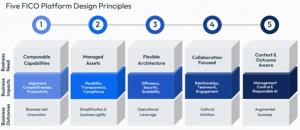JOHANNESBURG, GAUTENG , SOUTH AFRICA, May 17, 2023/EINPresswire.com/ — Bryan Howard- FICO Platform Solutions Partner
Today’s digital landscape is being driven by the growing need for “composable enterprises” – business capability models that can quickly and seamlessly evolve in response to changing customer demands and market conditions. Executives, Digital innovators, DevOps leaders, and line of business leaders should embrace a composable business model to gain agility and other benefits.
Characteristics of a Composable Enterprise
Modularity, autonomy, and interoperability are the three key building blocks of a composable enterprise:
1. Modularity is when data is organized into small, discrete units that can be used to create new data sets quickly and easily.
2. Autonomy refers to the ability of components within an organisation’s data architecture to operate independently from one another as business capabilities. while still functioning as part of an overarching data platform.
3. Interoperability is the ability for data to flow between multiple silos without any manual intervention from IT or other departments in the organisation.
By leveraging these three characteristics, organisations have access to deeper insights faster and can automate services delivery with intelligent automation toolsets that deliver real-time data feeds across all aspects of operations.
Benefits of the Composable Enterprise Model
The composable enterprise model helps organisations realise digital transformation with numerous benefits. Firstly, data science and product management teams can work more productively together to drive deeper insights across the organisation’s operations and customer data. These insights and access to data lead to more effective decisions that drive better customer experiences, increased ROI, and improved business capabilities and outcomes.
Secondly, digital experience teams can quickly scale innovative solutions with enhanced agility by leveraging a modular data architecture and complex problem solving for creating intuitive solutions, without depending on IT resources or third-party vendors.
Finally, uniquely skilled innovators can work together in an open collaboration environment enabled by platforms rather than purpose-built OTS software products to develop and iterate powerful disruptive applications that keep the business healthy and ahead of the curve.
Kubernetes, Microservices and No-Code Tools Unlock Composability
Kubernetes is an open-source system for automating the deployment, scaling, and management of containerized applications. It provides a platform for deploying a wide range of services from existing workloads to microservices, streaming data services, machine learning applications and more. Kubernetes can be used to quickly scale existing architecture and provide improved composability, and reliability in monitoring and managing services.
Microservices architecture is a design pattern which breaks up a larger application into smaller, loosely coupled services. These services are independent and can be deployed, managed, and scaled independently of each other. By breaking up the composable architecture into smaller, more manageable chunks, organisations can quickly and easily introduce new features and packaged business services to meet customer needs.
No-code tools are a new breed of design and service delivery tools that allow business subject matter experts to create, test, and deploy powerful new applications without writing code. These tools leverage architecture and protocols that are built on top of existing cloud infrastructure, enabling organisations to quickly spin up sophisticated business applications without depending on IT.
Collectively, these capabilities help businesses to understand customer needs and compose solutions quickly and cost-effectively, which is the key to success in today’s digital economy Organisation
By embracing a more composable business model, organisations have the power to turn their vision into reality.
Composability is one of the five design principles for FICO Platform
About FICO
FICO (NYSE: FICO) powers decisions that help people and businesses around the world prosper. Founded in 1956, the company is a pioneer in the use of predictive analytics and data science to improve operational decisions. FICO South Africa is headquartered in Illovo, Sandton.
Join the conversation at https://twitter.com/fico & http://www.fico.com/en/blogs/.
For FICO news and media resources, visit www.fico.com/news.
FICO is a registered trademark of Fair Isaac Corporation in the United States and in other countries.
Media Contact:
FICO SA PR Team
Nichollars Khoza
nicho@britespark.co.za
Nichollars Khoza
FICO
email us here
![]()






















